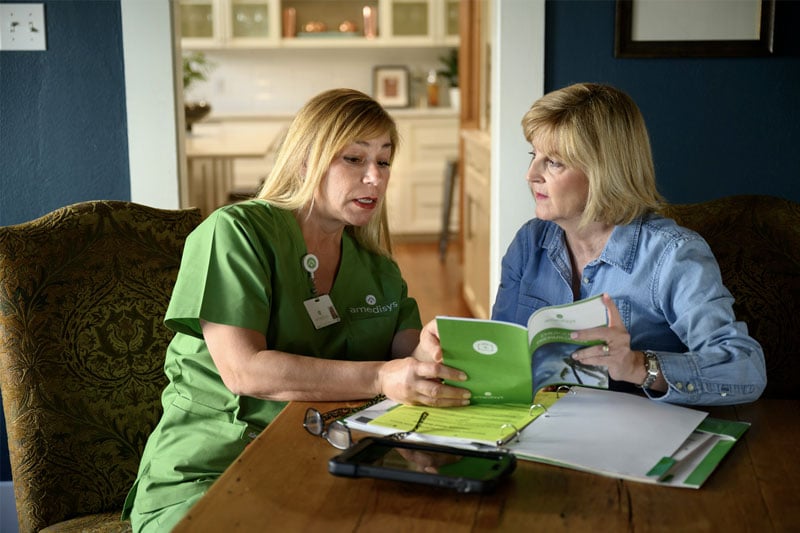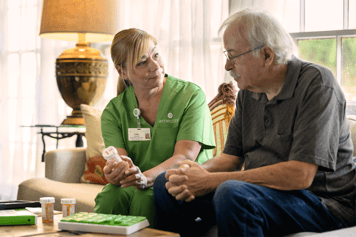Many older people in end-of-life stages experience a spectrum of pain, ranging from dull and infrequent to severe and uncontrollable. Experiencing this pain often makes eating, sleeping, completing tasks, and enjoying the remainder of time more difficult.
Hospice services have the central goal of symptom control to help patients experience comfort, dignity, and a higher quality-of-life. At Amedisys, our hospice services begin with the understanding that “pain” can be defined differently based on the experiences of the individual. Physical pain may be the primary ailment for one person, whereas emotional pain could be that for another.
Read on to learn how our expert medical, emotional, and spiritual care teams help patients with pain management to better understand how we might be able to help your parent or loved one.
The Benefits of Pain Management
Many hospice care providers understand pain management as symptom control. Although this is a necessary component of pain management, at Amedisys, we believe pain management is also about improving the overall quality-of-life. To us, it’s about empowering patients and their families to live out their final days in ways that bring them the most meaning and joy.
Once we work to meet the patient’s pain goal, they begin seeing improved moods, increased tolerance for activities, and more motivation to accomplish goals. Plus, caregivers often feel a sense of relief and can spend more quality time with their ailing family member.
Assessing Pain in Each Individual Patient
At Amedisys, pain is understood in the context of an individual’s experience. Some patients experience physical pain; some experience spiritual or emotional pain; whereas others experience a combination of all three. Because of this, we work to fully understand how each patient experiences pain before beginning a treatment plan. From there, each session begins with an assessment that measures:
- The type of pain: Visceral (internal organs), Somatic (pain receptors – skin, joints, bone), and Neuropathic (nerve)
- The quality of pain experienced (e.g., sharp, dull, burning, aching).
- The location of the pain.
- The severity of the pain.
- Activities that make the pain better, such as lying down, pressure, or deep breathing.
- Activities and other factors that make the pain worse.
- The times of day when the pain is better or worse.
- How the pain impacts daily activities.
As the patient’s chosen caregiver, you are encouraged to be present during these assessments. You play a crucial role in reporting non-verbal signs of pain, such as agitation, disrupted sleep patterns, poor appetite, or major mood changes.
With these answers and observations, the nurse and the rest of the interdisciplinary hospice team can create a pain management treatment plan. The majority of plans include two approaches: medication and non-medication treatments.
Treating Pain Through Medication
Based on the patient’s goals and type of care, the Amedisys hospice care team develops an individualized medication treatment plan. Each plan is specific to the patient and varies by the medicine, dosage, and schedule.
Your physician and hospice care team determine which medicine to prescribe based on assessed pain factors. Medicine ranges from over the counter (OTC) analgesics to mild narcotics to opioids, depending on the patient’s pain level and individualized plan of care. Our doctors consistently check in with patients to adjust their treatment plan recommendations based on their condition.
Treating Pain Through Therapies and Techniques
At Amedisys, we view medication as a component of treatment, not the entire solution. Based on a patient’s needs, pain management often includes non-medication treatments, such as:
- Physical or Occupational therapy.
- Massage therapy.
- Cold and heat applications.
- Relaxation and meditation techniques.
Patients can also feel emotional pain during this period. Depression and anxiety symptoms are not uncommon during the final stages of life. At Amedisys, patients can collaborate with Social Workers who will help ease emotional discomfort through one-on-one sessions. They can also help family members with end-of-life planning, direct counseling, and referrals to community resources and bereavement services.
For many patients, spiritual counseling is an important part of their care plan. We provide Chaplains and Spiritual Counselors for those seeking spiritual guidance.
Manage Pain with Amedisys
The right pain management plan can make a difference at the end-of-life. An approach to hospice care that encompasses the whole person allows them to be more present and enjoy their final days among friends and family.
Contact a specialist from Amedisys today to take the next step toward a tailor-made hospice plan.





